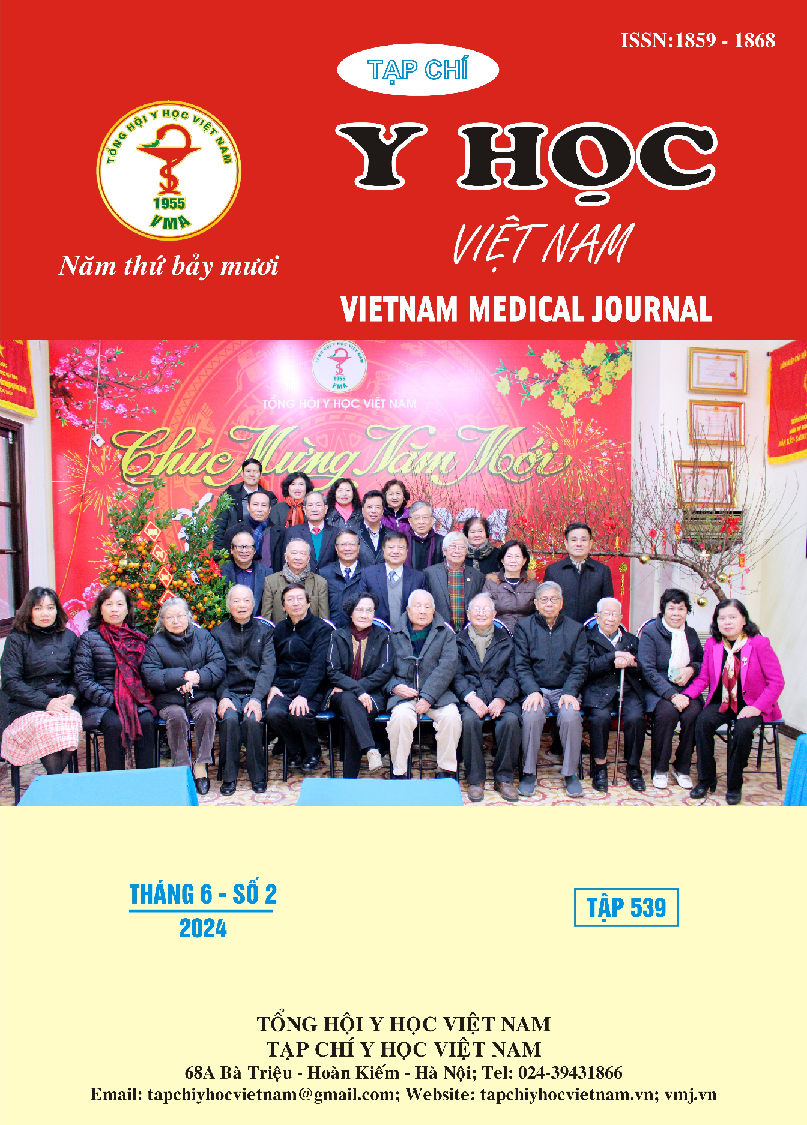DESCRIPTION OF SOME CLINICAL AND SUBCLINICAL FEATURES OF PATIENTS ADENOCARCINOMA OF LUNG HAVE BRAIN METASTASIS WITH EGFR MUTATION AT VIETNAM NATIONAL CANCER HOSPITAL
Main Article Content
Abstract
Objective: Description of some clinical and subclinical features of patients adenocarcinoma of lung have brain metastasis with EGFR mutation at Vietnam National Cancer Hospital. Patients and methods: Cross-sectional descriptive study on 66 patients adenocarcinoma of lung have brain metastasis with EGFR mutations (exon 19 deletion and L858R point mutation exon 21) were treated with first- generation TKIs at Vietnam National Cancer Hospital from October 2015 to January 2021. Results: The average age is 55 ± 10,6 years old, smoker/non smoker = ½, male/female = 1/1. Most patients have good physical condition (PS 0-1 = 89%). Most common symptom are prolonged cough (45,5%), chest pain (42,4%), dyspnea (19,7%) and headache (18,2%). The symptom of brain metastasis are intracranial hypertension (31,8%), weakness (6,1%), cranial nerve paralysis (1,5%) and seizures (4,5%). Almost size of primary tumor in range 3-7cm. Characteristics of brain metastatic leisons: most common are 2-3 leisons with lengths 1,1-2cm. The most common sites of extracerebral metastases are bone and pleura. Conclusion: The average age of the patients is 55 ± 10,6 years old, most patients are in good health, prolonged- cough is the most common symptom. Increased intracranial pressure is the most common neurological symptom. Most patients have metastases both in the brain and outside the brain.
Article Details
Keywords
brain metastases in lung cancer, EGFR mutation, clinical characteristics and subclinical characteristics
References
2. Tamura, T. et al. Specific organ metastases and survival in metastatic non‑small‑cell lung cancer. Mol. Clin. Oncol. 3, 217–221 (2015).
3. Lê Thu Hà, Trần Văn Thuấn. Đáp ứng thuốc Erlotinib trong điều trị bệnh nhân ung thư phổi không tế bào nhỏ giai đoạn muộn. Tạp Chí Học Thực Hành 993, 53–55 (2016).
4. Nguyễn Minh Hà, Trần Vân Khánh, Tạ Thành Văn và CS. Erlotinib bước một trên bệnh nhân ung thư phổi không tế bào nhỏ giai đoạn muộn có đột biến gen EGFR. Tạp Chí Nghiên Cứu Học 91–94 (2014).
5. Nghiêm Trần Vượng. Đánh giá kết quả Erlotinib bước 1 trong điều trị ung thư phổi không tế bào nhỏ giai đoạn IV có đột biến EGFR. Luận Văn Thạc Sĩ Học Đại Học Hà Nội (2020).
6. Nguyễn Thị Thanh Huyền. Đánh giá kết quả điều trị ung thư phổi không tế bào nhỏ di căn não đột biến EGFR bằng Erlotinib có hoặc không kết hợp với xạ trị tại não (2018).
7. Gridelli, C. & Rossi, A. EURTAC first-line phase III randomized study in advanced non-small cell lung cancer: Erlotinib works also in European population. J. Thorac. Dis. 4, 219–220 (2012).
8. Jiang, T. et al. EGFR TKIs plus WBRT Demonstrated No Survival Benefit Other Than That of TKIs Alone in Patients with NSCLC and EGFR Mutation and Brain Metastases. J. Thorac. Oncol. 11, 1718–1728 (2016).


